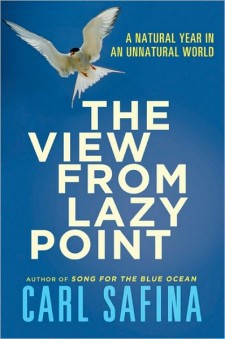Reviewed by Grant McCreary on September 26th, 2014.
I wasn’t planning on reviewing this book. It’s not really a “bird book”, although birds are present. But more than that, there’s the fact that I started reading it…well, I honestly don’t remember when that was, but it had to be over two years ago. About halfway through, I sat it down. It wasn’t that it was bad, I just got distracted by other things and didn’t pick it back up. That is, until recently. And when I did, I had no idea why I stopped. But I knew, beyond any doubt, that I had to do this review.
The View from Lazy Point: A Natural Year in an Unnatural World is framed around one calendar year spent at Lazy Point, the author’s home on Long Island. Safina is uncannily attuned to its natural cycles. He tells of the comings and goings of birds and fish, moving up and down the coast in the midst of their annual migrations. If it was just about that singular spot, this would be a great read, even for those who have never set foot on Long Island. But Safina also weaves in trips to places further afield, from the Arctic (Alaska and Svalbard) to the tropics (Belize and Micronesia) to the Antarctic. He highlights the distinctiveness of these places while showing how they are all connected to one another and to Lazy Point. From Polar Bears and penguins (not together, of course) to the explosion of life that is Pacific coral reefs, this is exciting reading.
But The View from Lazy Point is more than a look at one place throughout the year, with some of the best travel narrative you’ll ever read thrown in to spice things up. While Safina is examining this place that he knows and loves, he can’t help but see how it has changed through the years. The diminution of fish and bird life is hard to ignore. The change in weather is obvious. This is the common thread running throughout the book – humans are changing this planet, and for the most part it’s not for the better. And the most far-reaching and destructive of these changes is climate change.
Yes, this book is about climate change. And that may be one of the reasons it took me so long to pick it back up, I was burned out on the topic or not really ready to deal with it. But my resumption of the book corresponded to another entry in the climate change saga – the 2014 Audubon State of the Birds report. This study finds that 314 North American birds will lose more than half of their suitable range by 2080. And that’s being conservative. Clearly, this is an issue. But it’s not just about birds. Safina does a wonderful job demonstrating that climate change has the potential to affect everything on this planet, ourselves not excluded.
Safina is an ecologist and he uses that training to show how climate change will affect the environment (and, in fact, already has been), with the goal of urging us to take measures to stop it. But he doesn’t stop there, also looking at it from an economic and even religious point of view. It doesn’t seem like the author is a religious man, but as one myself I’m constantly exasperated by those of us who don’t get it. Safina makes a great, succinct argument that combating climate change is something that religion should be concerned with, for the simple fact that we are commanded by God to consider future generations: “Religious people understand God as eternal, so to discount the future is to deny and cheapen God’s eternal presence, a sin against both God and the generations to come.”
And that, simply, is the takeaway from this book – we are screwing up this planet and we owe it to future generations to leave something for them. We are all affected – Christian and atheist, scientist and non-scientist, those living and those not yet born. You may not agree with everything the author says or does (such as his fishing exploits), and that’s perfectly fine. However, his main case is well-made and, in my opinion, unassailable.
The problems are numerous, the stakes are nothing short of civilization itself. But Safina sees hope. Life is resilient. We’ve seen it with the recovery of birds like the Bald Eagle and Peregrine Falcon, and the author takes us to a vibrant coral reef in the Pacific that not too long ago was virtually dead. And people can change. I only hope we do before it’s too late.
Not only does The View from Lazy Point present a vital message, it does so well. Every page is a treat to read, further making me wonder how I could have ever stopped reading it. Safina is easily one of the best authors I’ve ever read. His style is evocative but not showy, simultaneously understated and elegant. Sentences that, by all rights, should be glanced over on the way to something more profound I find myself savoring for their masterful turn of phrase, like how Red-tailed Hawks “spend the winter unburdening the marsh of voles.”
Recommendation
The View from Lazy Point: A Natural Year in an Unnatural World is for climate change what Silent Spring
was for pesticides. At least, it should be. It’s not only well-written, but also compelling, obligating the reader to consider the problem and what they can do about it. Please, read it.
Disclosure: I get a small commission for purchases made through links in this post.
Buy from NHBS
(based in the U.K.)



Comment